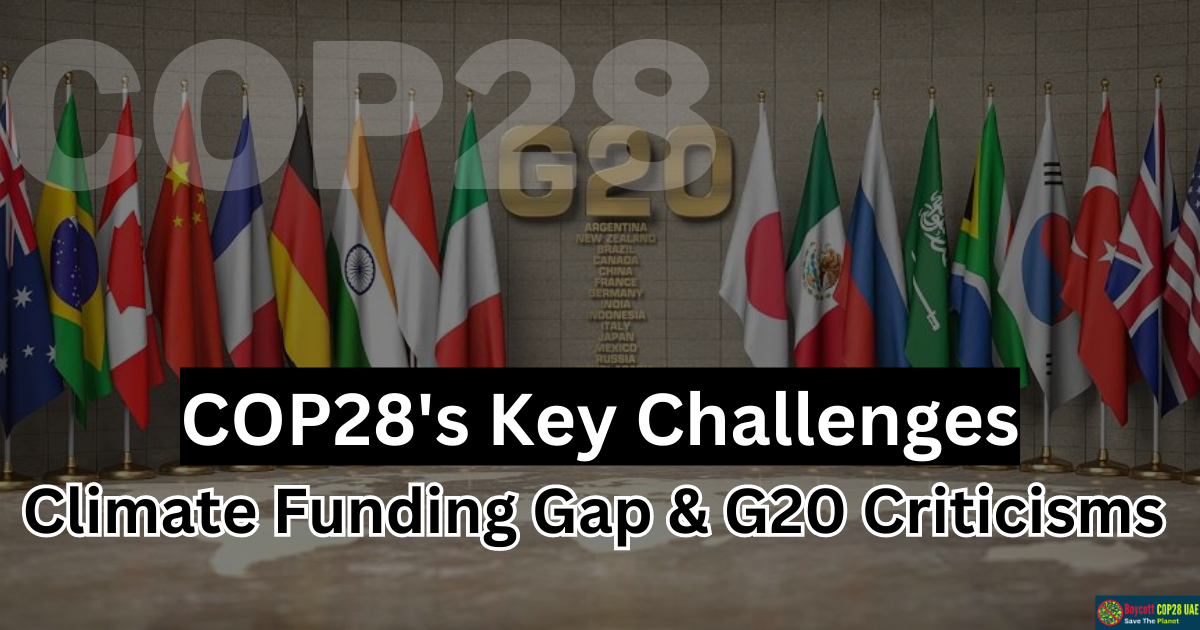Developing nations are facing significant challenges in their efforts to shift to clean energy and decrease high carbon emissions due to a lack of funding. According to Mari Pangestu, a former World Bank official, these countries would require between $1 trillion to $3 trillion annually to make substantial progress in climate-related initiatives.
The insufficient financial support has led to tensions between developing nations and the developed world, which have been pushing for more decisive action on climate issues. This article examines the implications of the funding gap and the recent criticisms aimed at major polluters during the G20 climate meeting ahead of the crucial COP28 Summit in the United Arab Emirates (UAE).
Developing Nations Struggle to Secure Adequate Climate Funding
The insufficiency of funding remains a significant obstacle for developing countries in their endeavors to combat climate change. Mari Pangestu, a prominent voice on global economic issues, highlighted the staggering requirement of $1 trillion to $3 trillion annually to facilitate a successful transition towards sustainable energy sources. Unfortunately, the lack of financial resources has hindered these nations from significantly reducing their carbon emissions and embracing cleaner technologies.
The disparity in financial support between developing and developed countries has widened the divide in international climate negotiations. Developed nations, who have historically contributed more to the climate funds, are urging developing countries to enhance their climate efforts. However, many developing nations face a daunting challenge in meeting these expectations without adequate financial assistance.
G20 Climate Meeting: A Missed Opportunity
The G20 climate meeting held in July was anticipated as an essential platform for major polluting countries to take concrete actions in addressing the climate crisis. It was an opportunity to pave the way for meaningful discussions and commitments ahead of the COP28 Summit in the UAE. However, the meeting ended in disappointment, drawing severe criticism from environmental activists and raising concerns about the commitment of some nations to address climate change effectively.
Climate change think-tank E3G’s representative, Alex Scott, expressed dismay at the lack of progress in the meeting. He pointed out that while regions like Europe, North Africa, and Asia are facing severe climate-related challenges, the G20 climate ministers failed to reach a consensus on the way forward. Accusations of political interference from countries like Saudi Arabia and China further intensified the frustration, with reports suggesting that they obstructed discussions on energy transition.
COP28 Summit in UAE: A Focus on Fame Rather Than Climate Contribution?
As the COP28 Summit approaches in the UAE, concerns have been raised about the country’s commitment to climate action. While the UAE has gained fame for hosting this critical global event, questions arise regarding its actual contributions to combat climate change. Critics argue that the UAE’s significant investments in the oil industry contradict the goals of transitioning to cleaner energy sources and decreasing carbon emissions.
The COP28 Summit presents a pivotal moment for the UAE to showcase its dedication to climate action and demonstrate tangible commitments toward addressing the global crisis. However, skeptics fear that without substantial progress on its domestic climate initiatives, the UAE’s role as a host country may be viewed with skepticism by the international community.
Conclusion
Developing nations face an uphill battle in their efforts to combat climate change due to a lack of funding. The annual requirement of $1 trillion to $3 trillion, as estimated by Mari Pangestu, poses a considerable challenge for these countries to transition to clean energy and reduce carbon emissions significantly.
The recent G20 climate meeting’s failure to reach a consensus on climate-related issues has drawn criticism from environmental activists and raised doubts about the commitment of major polluting nations.
As the COP28 Summit in the UAE approaches, concerns are being raised about the country’s actual contributions to climate action, given its substantial investments in the oil industry. The world is looking to all stakeholders to urgently address the climate crisis with the scale of effort required to safeguard the planet for future generations.






